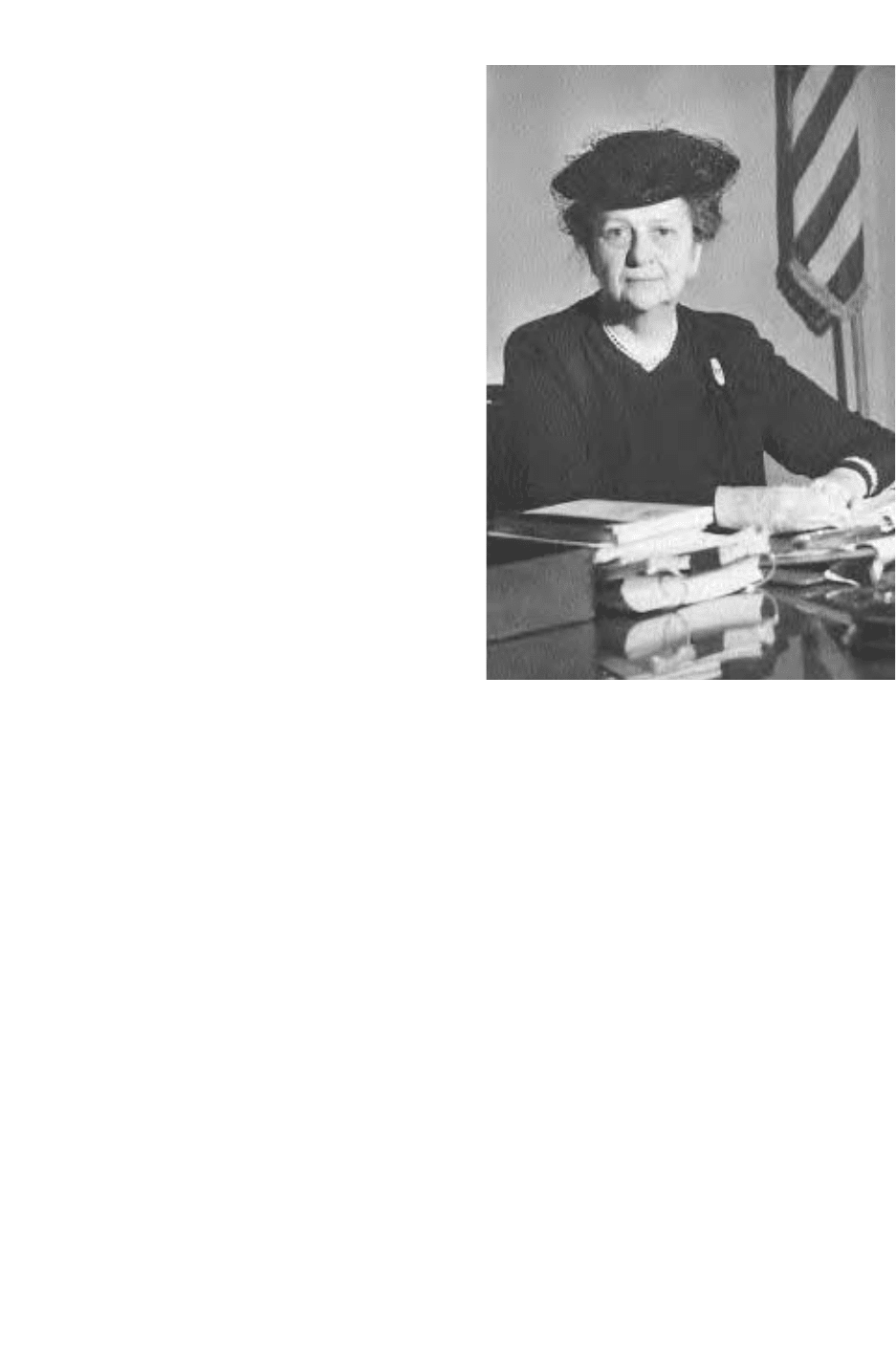Schenken Suzanne O’Dea. From Suffrage to the Senate: An Encyclopedia of American Women in Politics (2 Volumes)
Подождите немного. Документ загружается.


Women’s Bureau of the Department of Labor has established the Fair Pay
Clearinghouse, offering resources and information about fair pay. Con-
servative groups, including Concerned Women for America, have gener-
ally opposed the idea of pay equity.
See also Civil Rights Act of 1964, Title VII; Coalition of Labor Union Women;
Concerned Women for America; County of Washington, Oregon v. Gunther;
Employment Discrimination; Equal Employment Opportunity Commission;
National Committee on Pay Equity; Women’s Bureau
References Baer, Women in American Law, 2nd ed. (1996); www.cwfa.org;
www.dol.gov/dol/wb/public/programs.
Peace Movement
Women’s leadership in the peace movement gained visibility and formal
organization in 1914 as war raged in Europe. The Woman’s Peace Party
has its roots in the Civil War era and developed in response to World War
I, later becoming the U.S. section of the Women’s International League for
Peace and Freedom (WILPF). Jane Addams, Emily Greene Balch, and Car-
rie Chapman Catt were among the most notable leaders in the two or-
ganizations. During the interwar years, peace activists sought disarma-
ment and mediation for international disputes. The peace movement
languished during World War II and gained limited momentum in the
1950s as activists opposed the proliferation of nuclear weapons and inter-
vention by the U.S. military in conflicts.
Concern about radioactive fallout from aboveground nuclear bomb
threats prompted the formation of Women Strike for Peace (WSP) in
1961. Along with other women and men who were not part of established
organizations, WSP and WILPF opposed the Vietnam War and publicly
demonstrated against U.S. involvement in it. In the 1980s and 1990s,
peace activists advocated a range of alternatives to war to resolve interna-
tional conflicts, including educational programs, economic development,
and increased power for women.
See also Addams, Jane; Balch, Emily Greene; Catt, Carrie Clinton Lane
Chapman; Woman’s Peace Party; Women Strike for Peace; Women’s
International League for Peace and Freedom
References Alonso, Peace as a Women’s Issue: A History of the U.S. Movement
for World Peace and Women’s Rights (1993).
Pelosi, Nancy B. (b. 1940)
Democrat Nancy Pelosi of California entered the U.S. House of Represen-
tatives on 2 June 1987. The daughter of Thomas D’Alesandro, a former
member of Congress and a former mayor of Baltimore, Pelosi grew up in
a powerful political family. Democratic national committeewoman for
Pelosi, Nancy B. 529

California from 1976 to 1996, Pelosi chaired the Northern California
Democratic Party from 1977 to 1981 and was state party chair from 1981
to 1983. She was financial chairperson of the Democratic Senatorial
Campaign Committee from 1985 to 1986.
Early in 1987, Sala Burton, the incumbent member of Congress for
the district, was stricken ill with cancer and endorsed Pelosi to succeed
her. Although well known among party leaders, Pelosi was not familiar to
voters, and Burton’s support helped her win the election.
When the Presidio, a military base in San Francisco, was scheduled to
be closed, Congresswoman Pelosi worked to have it converted to national
park land. To ease the financial burden on the National Park Service,
which was already underfunded, she proposed leasing the grounds for five
years and putting the proceeds in a trust fund to maintain the buildings
and grounds.
Congresswoman Pelosi has written and passed legislation relating to
health insurance coverage, programs for people stricken with acquired
immunodeficiency syndrome (AIDS), and perinatal care for low-income
families. Pelosi has also authored and passed bills to prevent homelessness
among people with AIDS, to preserve housing for low-income people, and
to promote human rights and environmental protection.
Born in Baltimore, Maryland, Nancy Pelosi received her bachelor of
arts degree from Trinity College in 1962.
See also Congress, Women in
References Congressional Quarterly, Politics in America 1996 (1995); Office of
the Historian, U.S. House of Representatives, Women in Congress, 1917–1990
(1991); www.house.gov/pelosi.bio_pel.htm.
Perkins, Frances (Fanny) Corlie (1882–1965)
Appointed secretary of labor in 1933 by President Franklin D. Roosevelt,
Frances Perkins was the first woman to hold a cabinet position. A social
reformer, Perkins entered politics through her work as a researcher and
lobbyist for the New York Consumers League. She found a supporter for
the league’s agenda in assemblyman Al Smith, who helped her pass a bill
limiting women’s and children’s workweeks to fifty-four hours. In 1919,
when Smith was governor of New York, he asked Perkins to serve on the
state’s Industrial Commission, a position she held until 1921, when Smith
lost his bid for reelection. After Smith won his 1923 bid for the governor-
ship, he appointed Perkins to the New York Industrial Board. In 1928,
Franklin D. Roosevelt was elected governor of New York. Through the ef-
forts of Democratic Party leader Molly Dewson, who had organized
women to help Roosevelt win the election, Governor Roosevelt appointed
Perkins to serve again on the New York Industrial Commission. After
530 Perkins, Frances (Fanny) Corlie

Roosevelt was elected president in 1932,
Dewson again served as Perkins’s advocate
and persuaded him to appoint Perkins to
the position of secretary of labor.
Perkins had several ideas for the De-
partment of Labor’s role in relieving the
problems created by the Depression. She
believed in public works to stimulate the
economy, advocated passing federal min-
imum wage legislation, and argued for
unemployment insurance. She reorga-
nized the Bureau of Immigration, the Bu-
reau of Labor Statistics, and the federal
employment office and developed the
Civilian Conservation Corps. She orga-
nized a conference that brought together
union representatives and the Depart-
ment of Labor to plan strategies to re-
spond to the Depression. They developed
a package of recommendations that in-
cluded establishing a federal employment
relief fund that the states would distrib-
ute, creating public works to stimulate basic industries, abolishing child
labor, and placing limits on the number of hours employees worked
per week.
In 1934, Perkins chaired the Committee on Economic Security, the
group that drafted the framework for Social Security, unemployment in-
surance, and assistance for the elderly. The next year, Perkins drafted the
Public Contracts Act to replace the National Industrial Recovery Act
(NRA). Perkins helped pass the Fair Labor Standards Act of 1938, which
instituted a minimum wage, set maximum hours people could work, and
prohibited child labor in products sold in interstate commerce, policies
that reformers had advocated for decades.
As the nation began preparations for involvement in World War II,
the Depression eased, and the focus moved from economic recovery to
producing military materials and machinery. Perkins’s role changed as
many of the new programs and projects were designed and administered
by military and war boards and commissions. Following Roosevelt’s death
in 1945, Perkins resigned at President Harry Truman’s request. Truman
later appointed her to the Social Security Commission.
In 1955, she became a visiting professor at Cornell University. She
wrote People at Work (1934), a history of labor from the colonial era to the
Perkins, Frances (Fanny) Corlie 531
Frances Perkins,
appointed as
secretary of labor by
President Franklin D.
Roosevelt, was the
first woman to serve
in the U.S. Cabinet,
1941 (Courtesy:
National Archives)

Depression and a description of the Department of Labor’s responsibili-
ties, and The Roosevelt I Knew (1946).
Born in Boston, Frances Perkins earned her undergraduate degree
from Mount Holyoke in 1902 and her master’s degree from Columbia
University in 1910.
See also Cabinets, Women in Presidential; Child Labor Amendment;
Democratic Party, Women in the; Dewson, Mary (Molly) Williams; Protective
Legislation; Roosevelt, Eleanor
References Martin, Madam Secretary Frances Perkins (1976); Roosevelt and
Hickok, Ladies of Courage (1954).
Personal Responsibility and Work Opportunity
Reconciliation Act of 1996
The Personal Responsibility and Work Opportunity Reconciliation Act of
1996 made the most dramatic changes in welfare in the United States since
the Great Society programs of the 1960s by replacing the federal welfare
program with block grants to states that provided financial incentives for
moving welfare recipients into the workforce. The measure initiated work
requirements, limiting benefits to two years, at which time recipients
would have to show “work activity,” with a lifetime cap of five years. The
act also provided support for families moving from welfare to work
through child care funding and guaranteed medical coverage for a year af-
ter leaving welfare.
The law strengthened child support enforcement measures by creat-
ing new tools for identifying parents delinquent in their child support and
simplifying the legal process for establishing paternity. New provisions re-
lated to minors include the development of programs to prevent teen
pregnancy and the requirement that unmarried minor parents live with a
responsible adult or in a setting with adult supervision and participate in
educational and training activities.
Two years after the measure was enacted, the Children’s Defense
Fund (CDF) reported that welfare rolls had declined, that an increased
number of recipients had found employment, and that there was a slight
decline in the child poverty rate. CDF also reported that there was an in-
crease in extreme childhood poverty, that most of the new jobs paid
salaries below the poverty line (about $16,000 for a family of four in
1999), and that many former welfare recipients had not found steady jobs.
See also Children’s Defense Fund
References www.acf.dhhs.gov; www.childrensdefense.org.
532 Personal Responsibility and Work Opportunity Reconciliation Act of 1996

Personnel Administrator of the
Commonwealth of Massachusetts v. Feeney (1979)
In Personnel Administrator of the Commonwealth of Massachusetts v.
Feeney, Massachusetts state employee Helen B. Feeney challenged the con-
stitutionality of Massachusetts’s veterans preference law on the grounds
that it discriminated against women in violation of the equal protection
clause of the Fourteenth Amendment. The Massachusetts law states that
all veterans who qualify for state civil service positions must be considered
for appointment before any qualifying nonveterans. Feeney, who was not
a veteran, had been a state employee for twelve years and had passed sev-
eral qualifying civil service exams for higher-paying positions, but she had
not been appointed to them because veterans had to be considered before
nonveterans. Feeney argued that because until 1975 the military had quo-
tas limiting the number of women who could serve in it to 2 percent, the
policy violated her Fourteenth Amendment rights.
The Court wrote: “Absolute and permanent preferences...have al-
ways been subject to the objection that they give the veteran more than a
square deal. But the Fourteenth Amendment cannot be made a refuge
from ill-advised . . . laws. The substantial edge granted to veterans [by the
Massachusetts law] may reflect unwise policy.” The Court found the Mas-
sachusetts veterans preference law constitutional.
See also Fourteenth Amendment
References Personnel Administrator of the Commonwealth of Massachusetts v.
Feeney, 442 U.S. 256 (1979).
Peterson, Esther (1906–1997)
The highest-ranking woman in President John F. Kennedy’s administra-
tion, Esther Peterson was director of the Women’s Bureau of the U.S. De-
partment of Labor from 1961 to 1964 and assistant secretary of labor for
labor standards from 1961 to 1969. Peterson’s work in labor issues began
in the 1930s, when she taught at the Bryn Mawr Summer School for
Women Workers in Industry. Assistant director of education for the
Amalgamated Clothing Workers of America, she was the organization’s
lobbyist in the 1940s. From 1958 to 1961, she lobbied for the American
Federation of Labor–Congress of Industrial Organizations (AFL-CIO).
From her years in the labor movement, Peterson strongly supported
protective labor legislation for women and adamantly opposed the Equal
Rights Amendment (ERA) because it would make such protective mea-
sures unconstitutional. In the hopes of proving the ERA unnecessary, Pe-
terson lobbied Kennedy to create a commission to study state and federal
laws and policies related to women. With the added encouragement of
Peterson, Esther 533

Eleanor Roosevelt, Kennedy established the President’s Commission on the
Status of Women in 1961 and made Peterson its executive vice chairperson.
Another priority of Peterson’s was to get Congress to pass the equal
pay for equal work bill that had languished since 1945; she believed that
its passage would also help reduce interest in the ERA. In 1961, Peterson
hired a lobbyist to coordinate congressional work for the equal pay bill
and enlisted the help of Congresswoman Edith Green and others. The
Equal Pay Act became law in 1963.
When President Lyndon Johnson appointed Peterson to be a special
assistant for consumer affairs in 1964, one trade group called her “the
most pernicious threat to advertising today.” Peterson worked for uniform
packaging, unit pricing, truth in advertising, and nutrition information
labeling. At one time, manufacturers used codes for the expiration dates
on perishable items; she successfully pressed for “sell by” or “use by” dates.
She resigned from the Johnson administration because of the pressure
from business. She said: “Industry hated me, but you’ve got to say what
you’ve got to say.”
Peterson returned to the Amalgamated Clothing Workers of America
from 1969 to 1970. She was chair of the Consumer Affairs Council from
1970 to 1980, and during President Jimmy Carter’s administration, she
again served as special assistant to the president for consumer affairs from
1977 to 1980. President Bill Clinton appointed her to the U.S. delegation
to the United Nations in the mid-1990s.
Born in Provo, Utah, Peterson earned her bachelor of arts degree from
Brigham Young University in 1927 and her master of arts degree from Co-
lumbia Teachers College in 1930. She began her teaching career in 1927 at
the Branch Agricultural College in Cedar City, Utah, in 1927. She also
taught at Utah State University, Windsor School in Boston, and the Bryn
Mawr Summer School for Women Workers in Industry from 1932 to 1939.
See also Equal Pay Act of 1963; Equal Rights Amendment; National Organization
for Women; President’s Commission on the Status of Women; Women’s Bureau
References Harrison, On Account of Sex: The Politics of Women’s Issues,
1945–1968 (1988); New York Times, 18 December 1996, 22 December 1997.
Pettis Roberson, Shirley Neil McCumber (b. 1924)
Republican Shirley Pettis of California served in the U.S. House of Repre-
sentatives from 29 April 1975 to 3 January 1979. Following the death of
her husband, Congressman Jerry Pettis, Shirley Pettis won the special elec-
tion to fill the vacancy. She passed legislation that established the Califor-
nia Desert Conservation Area and gave wilderness status to almost
500,000 acres in the Joshua Tree National Monument. She won a full term
in 1976 but did not seek a second full term.
534 Pettis Roberson, Shirley Neil McCumber

Born in Mountain View, California, Shirley Pettis attended Andrews
University in Michigan from 1942 to 1943 and the University of Califor-
nia at Berkeley from 1944 to 1945.
See also Congress, Women in
References Office of the Historian, U.S. House of Representatives, Women in
Congress, 1917–1990 (1991).
Pfost, Gracie Bowers (1906–1965)
Democrat Gracie Pfost of Idaho served in the U.S. House of Representa-
tives from 3 January 1953 to 3 January 1963. Pfost first ran for Congress
in 1950 but lost. When she ran in 1952, she designed her campaign slogan
to let voters know how to pronounce her name: “Tie Your Vote to a Solid
Post—Gracie Pfost for Congress.” As a member of Congress, Pfost sup-
ported irrigation, flood control, and power projects on the Snake River,
and she wanted the federal government to build them. Nicknamed “Hell’s
Belle”for her fight against private construction of a dam in Hell’s Canyon,
she lost the battle in 1957. She is credited with passing the Wilderness Act
that preserved areas in the far West. She unsuccessfully ran for the U.S.
Senate in 1962. From 1963 until her death, Pfost served as special assistant
for the elderly in the Federal Housing Administration.
Born in Harrison, Arkansas, Gracie Pfost graduated from Link’s
Business College and Secretarial School in Boise, Idaho, in 1929. Over the
next ten years, she held several offices in the Canyon County, Idaho, gov-
ernment. From 1941 to 1951, she was the county’s treasurer.
See also Congress, Women in
References Engelbarts, Women in the United States Congress, 1917–1972 (1974);
Office of the Historian, U.S. House of Representatives, Women in Congress,
1917–1990 (1991); Tolchin, Women in Congress: 1917–1976 (1976).
Phillips v. Martin Marietta Corporation (1971)
Phillips v. Martin Marietta Corporation was the first case to reach the U.S.
Supreme Court that dealt with gender discrimination under Title VII of
the Civil Rights Act of 1964. In the case, Ida Phillips, a mother with two
young children, applied for an assembly trainee position with Martin Ma-
rietta, but the company’s hiring policy excluded mothers with preschool
children. The company, however, did hire men with preschool children.
The Court decided that the company’s policy discriminated against
women based on Title VII.
See also Civil Rights Act of 1964, Title VII; Employment Discrimination; Sex
Discrimination
References Phillips v. Martin Marietta Corporation, 400 U.S. 542 (1971).
Phillips v. Martin Marietta Corporation 535

Planned Parenthood Association of
Kansas City, Mo. v. Ashcroft (1983)
In Planned Parenthood Association of Kansas City, Mo. v. Ashcroft, the U.S.
Supreme Court considered four questions regarding Missouri laws related
to abortion. The Court rejected the state’s requirement that abortions af-
ter twelve weeks of pregnancy had to be performed in a hospital because
it “unreasonably infringes upon a woman’s constitutional right to obtain
an abortion,” as the Court noted in Akron v. Akron Center for Reproductive
Health (1983). The Court found that the state’s requirement of a pathol-
ogy report after an abortion was reasonable and constitutional. The Court
also accepted the state’s requirement that a second physician be present
during abortions because the state has a compelling interest in fetal life. In
addition, the Court accepted the state’s requirement that minors obtain
parental consent or consent from the juvenile court for an abortion, say-
ing that by providing the judicial alternative to parental consent, the state
had met the legal standards.
See also Abortion; Akron v. Akron Center for Reproductive Health
References: Congressional Quarterly, Congressional Quarterly Almanac, 98th
Congress, 1st Session...1983 (1984); Planned Parenthood Association of Kansas
City, Mo. v. Ashcroft, 462 U.S. 476 (1983).
Planned Parenthood Federation of America
Founded in 1939 as the Birth Control Federation of America, Planned
Parenthood Federation of America (PPFA) provides reproductive health
care, offers educational programs on human sexuality, promotes research
on reproductive health, and advocates public policies that guarantee re-
productive rights. PPFA and its affiliates have challenged several state and
federal laws in the courts and have participated in cases initiated by oth-
ers that relate to reproductive rights. PPFA has over 150 affiliates in forty-
nine states and the District of Columbia and serves more than 5 million
Americans.
The Birth Control Federation of America was formed when the
American Birth Control League and the Clinical Research Bureau merged
in 1939. Birth control advocate Margaret Sanger had founded both groups
in her quest to overturn the portions of the 1873 Comstock laws that clas-
sified contraceptive information as obscene and made its dissemination
illegal. In 1936, the U.S. Circuit Court of Appeals decided in United States
v. One Package of Japanese Pessaries (a pessary is a contraceptive device)
that birth control could no longer be classified as obscene, but the deci-
sion applied only to New York, Connecticut, and Vermont. In 1965 the
U.S. Supreme Court found unconstitutional state laws prohibiting mar-
ried couples from using contraceptives in Griswold v. Connecticut, and in
536 Planned Parenthood Association of Kansas City, Mo. v. Ashcroft

1972 the Court found unconstitutional a state law forbidding the distri-
bution of contraceptives to unmarried people in Eisenstadt v. Baird.
After the U.S. Supreme Court legalized abortion in Roe v. Wade,
PPFA affiliates began offering abortion counseling and services in their
clinics as well as continuing to offer family planning counseling and dis-
tributing contraceptives. As the states and the federal government enacted
restrictions on abortions, such as informed consent, parental notification
or consent, and other regulations, PPFA and its affiliates challenged these
policies in the courts.
As the acquired immunodeficiency syndrome (AIDS) epidemic
struck the nation in the 1980s, PPFA affiliates worked to educate the pub-
lic about the disease and other sexually transmitted diseases as part of
their mission to provide a wide range of reproductive health services, in-
cluding screening. The organization has also worked to address the prob-
lem of teen pregnancy through its educational programs.
See also Abortion; Dennett, Mary Coffin Ware; Eisenstadt v. Baird; Griswold v.
Connecticut; Roe v. Wade; Sanger, Margaret Louise Higgins
References www.plannedparenthood.org.
Planned Parenthood of Central Missouri v. Danforth (1976)
In Planned Parenthood of Central Missouri v. Danforth, the U.S. Supreme
Court considered several aspects of a Missouri abortion law. The Court
accepted the state’s requirement that a woman seeking an abortion sign a
form asserting that she had freely given her consent to the procedure as
well as the requirement that health facilities and physicians performing
abortions maintain records on the abortions they perform and report
them to the state. The Court rejected the stipulation that a married
woman obtain the written consent of her spouse before obtaining an
abortion, saying that the state cannot give a husband power that the state
is forbidden to exercise. The Court also found unconstitutional the re-
quirement that an unmarried woman under the age of eighteen obtain
written consent from a parent before being able to have an abortion, al-
though the Court would revisit this issue several times over the next two
decades. It rejected the prohibition against using the abortion procedure
known as saline amniocentesis after the first twelve weeks of the preg-
nancy. The Court said that it was the most commonly used and safest pro-
cedure and that the policy was designed to prevent the majority of abor-
tions after the first twelve weeks, thus making it unconstitutional. Finally,
the Court found unconstitutional the requirement that physicians pre-
serve the fetus’s life and health regardless of the stage of the pregnancy.
See also Abortion
References Planned Parenthood of Central Missouri v. Danforth, 428 U.S. 52 (1976).
Planned Parenthood of Central Missouri v. Danforth 537

Planned Parenthood of Southeastern Pennsylvania v. Casey (1992)
The U.S. Supreme Court affirmed a woman’s right to end a pregnancy in
its early stages, discarded the trimester framework it had established in
Roe v. Wade, adopted a less rigorous standard for review of abortion re-
strictions, and approved new restrictions on the procedure in Planned
Parenthood of Southeastern Pennsylvania v. Casey. The new standard for
evaluating abortion laws became “undue burden test,” meaning that state
regulations can survive constitutional review as long as they do not place
a “substantial obstacle in the path of a woman seeking an abortion of a
nonviable fetus.”
The Court upheld a Pennsylvania law mandating a twenty-four-hour
waiting period before an abortion may be performed, overturning its
1983 decision in City of Akron v. Akron Center for Reproductive Health. It
also upheld a provision requiring physicians to provide patients with in-
formation about fetal development in an effort to discourage abortion,
overturning its 1986 decision in Thornburgh v. American College of Ob-
stetrics and Gynecology. A provision requiring reports on abortions, in-
cluding the name and location of facilities performing abortions that re-
ceive state funds, was also upheld. The Court struck down a provision that
required a married woman seeking an abortion to notify her husband be-
fore the procedure could be performed.
See also Abortion; Akron v. Akron Center for Reproductive Health; Roe v. Wade;
Thornburgh v. American College of Obstetrics and Gynecology
References Congressional Quarterly, Congressional Quarterly Almanac, 102nd
Congress, 2nd Session...1992 (1993); Planned Parenthood of Southeastern
Pennsylvania v. Casey, 505 U.S. 833 (1992); www.aclu.org.
Poelker v. Doe (1977)
The public hospitals owned by the City of St. Louis provided publicly fi-
nanced hospital services for childbirth and abortions when there was a
threat of grave physiological injury or death to the mother. The hospitals
did not provide nontherapeutic abortions. The question before the U.S.
Supreme Court was whether the policy violated any constitutional rights.
The Court concluded that the constitutional question involved was the
same as that involved in Maher v. Roe (1977), which concerned a state’s re-
fusal to provide Medicaid benefits for abortions while providing them for
childbirth. As in Maher, the Court found that the City of St. Louis did not
violate the Constitution by providing publicly financed hospital services for
childbirth and for certain abortions but not for nontherapeutic abortions.
See also Abortion; Maher v. Roe
References Poelker v. Doe, 432 U.S. 519 (1977).
538 Planned Parenthood of Southeastern Pennsylvania v. Casey
